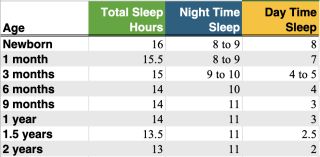Sleep
My Baby Sleeps a Lot. Why Am I So Tired?
Newborns and their parents are peculiarly mismatched sleepers.
Updated April 6, 2024 Reviewed by Ray Parker
Key points
- Parents of newborns are tired because their sleep schedules are very different from those of infants.
- Adults sleep in long stretches, mostly at night. Newborns sleep 16 hours daily, but 1 or 2 hours at a time.
- Infants' total daily sleep needs goes down slowly. Much earlier, they shift most of their sleep to the night.
According to Stanford Medicine, newborns sleep 16 hours a day. That's a lot. So why are the parents of newborns so tired?
Unfortunately, sleeping in long, consolidated stretches of time—and at night—is a skill that babies need to learn. Adults' sleep cycles are 90 minutes long, and most sleep in long stretches of seven to nine hours a night. Newborns sleep 16 hours a day but do so in one- to two-hour stretches.

Why? Newborns have tiny bellies that hold very small amounts of the only food they can digest—human milk or formula.
Although they are small, they burn a huge amount of calories. They double their weight during their first four months of life and double their height in three years. They are born with between 275 and 300 bones because their bones have yet to form and need to grow together fully. Over their first few years, those bones fuse down to 206.
All that growth requires a lot of calories. In addition, because they are so small, babies have a great deal of surface area for their small mass. Thus they lose a lot of heat to the air (which is why they are often cold). Keeping themselves warm also burns calories.
So they eat. Newborns wake often because they eat every 90 minutes or so. It takes a while to eat, and then they are off to sleep again. Ninety minutes later, well, it's no wonder that parents are tired.
Babies Slowly Shift From Sleeping All Day to Sleeping at Night
Looking at the table above, you can see that as babies grow, their total amount of sleep slowly decreases. Newborns sleep 16 hours a day, while 2-year-olds sleep 13. If that sleep time were still spread throughout the day, however, it would not help weary parents. Fortunately for adults, infants make a much larger change in their sleep. They consolidate sleep towards the evening.
As newborns, babies split their sleep between eight hours during the day and eight hours at night. By age 2, 11 of 13 hours of sleep occur at night, which fits much better into the average adult's schedule.
Sleeping Through the Night
"Most" babies don't start sleeping through the night (six to eight hours) without waking until they are about 3 months old or until they weigh 12 to 13 pounds. (Yes, larger babies sleep longer earlier; stored energy really matters.) Unfortunately, "most" is not all. Only about two-thirds of babies are able to sleep through the night on a regular basis by age 6 months, which means that one-third do not.
Interestingly, although a third of US infants are not sleeping through the night by 6 months, only 23% of parents report that their babies have problems sleeping, and 74% say their infants sleep well (Mindell et al. 2010). In general, parents whose infants sleep in their room report being much less bothered by nighttime waking than those whose babies sleep in separate rooms.
Although sleep is a core biological function, how long infants sleep and how it is organized varies markedly depending on where in the world you live. Japanese babies sleep an average of 11 hours per night, while babies in New Zealand sleep 13. Two additional hours. That is time worth more than gold.
References
Mindell JA, Sadeh A, Wiegand B, How TH, & Goh DYT (2010). Cross-cultural differences in infant and toddler sleep. Sleep Medicine, 11(3), 274–280.


